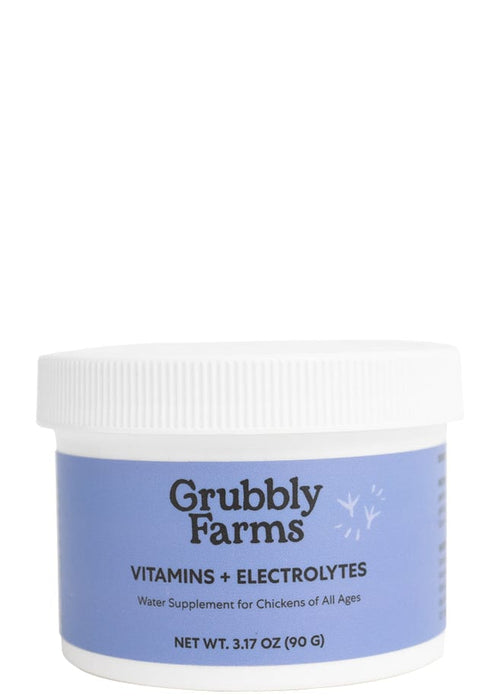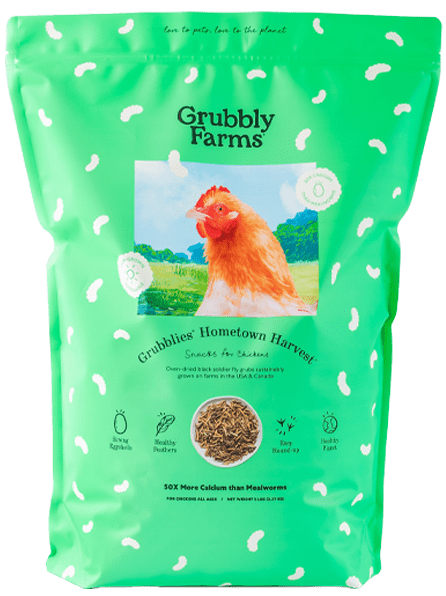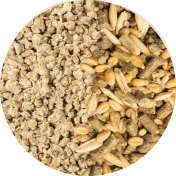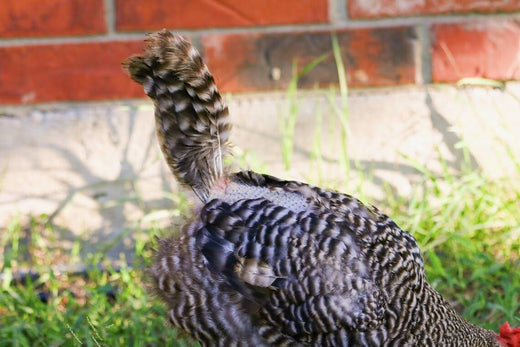Key Takeaways:
- There are five common types of stress that chickens can experience: environmental stress, nutritional stress, social stress, handling stress, and lighting stress.
- Chickens will exhibit certain symptoms and behaviors when they are stressed. Common symptoms of a stressed chicken include pacing, high-pitched alarm calls, lethargy, and weight loss.
- Stress affects a hen’s endocrine system. The endocrine system is essential for signaling the release of certain hormones that trigger egg production. When a hen is stressed, she may have an irregular laying pattern or stop laying completely.
- You can prevent stress in your backyard flock by taking measures such as creating a stress-free coop environment, providing nutritious feed, managing flock dynamics, properly handling your chickens, maintaining lighting consistency, and keeping your flock engaged through enrichment activities.
Sometimes we forget that animals can feel stress too, and chickens are no exception. Chickens can be impacted by stress which can affect their health, behavior, and egg production. It’s important to know what factors can cause a chicken to feel stressed so that you can take measures to prevent stress in your backyard flock. This guide will walk you through how to manage your chickens’ stress for better egg production and flock health!
Understanding Chicken Stress and Its Impact on Egg Production
Chickens can feel stress. Stress is the physiological or psychological response to internal or external pressures or changes. It can also be the body’s way of reacting to a threat, whether it’s an actual or perceived threat.
When a chicken feels stressed, it will start exhibiting stress symptoms and behaviors. Some stress is natural and unavoidable. However, when stress starts to build up or when multiple stressors are present, a chicken can start experiencing unhealthy levels of stress. A few common chicken stress symptoms include a drop in egg production, reduced growth rates in young chicks, low immunity to disease, feather loss, and a change in behavior.
Egg Production: Stress affects the endocrine system, which is responsible for controlling and regulating hormones. Certain hormones are key triggers for egg production. When stress disrupts hormone production, it can have a negative impact on egg production and egg quality. Stressed hens will lay fewer eggs, have irregular laying patterns, or may stop laying entirely.
Immunity: Stress inhibits the body’s intestinal, cellular, and humoral immunities. All of these systems are necessary for building a strong immune system that will fight against disease and pathogens. When these systems are compromised by stress, a chicken’s immune system is also compromised and reduces a chicken’s disease resistance.
Growth: Stress can negatively impact the growth rates of young chicks. Slow growth rates in maturing chicks at any stage in development could be an indicator that your brood is experiencing some stress factor.
Behavior: When stressed, your flock may start exhibiting behaviors that are not normal for a healthy flock. Stressed chicken behavior can be exhibited as feather pecking, cannibalism, aggression, shyness, pacing, and lethargy.
Feather Loss: Stress can also cause chickens to do a ‘mini molt’. Chickens naturally molt once a year, usually in the fall. However, when stressed, a chicken may be forced into a mini molt where it loses a lot of its feathers and then slowly regrows them. This stress symptom is commonly seen after a hen has incubated eggs or when a sudden light change causes stress.
Major Causes of Stress in Backyard Chickens
One of the best ways to manage stress in your flock is to be familiar with the major causes of stress in backyard chickens. When you know what causes stress, you can take measures to prevent those stressors from affecting your flock. Here are some common causes of stress in backyard chickens:
- Environmental stressors
- Nutritional stress
- Social stress
- Handling stress
- Lighting stress
Environmental Stressors
Environmental stressors can include factors such as changes in the weather, coop conditions, noises in the environment, and threats from predators.

Extreme temperatures are one of the most common environmental stressors that your flock will have to deal with. During the summer, extremely hot temperatures can cause heat stress. During the winter, extremely cold temperatures can cause cold stress.
A chicken’s body experiences heat stress when it is unable to stay cool. Symptoms of heat stress include panting, decreased food consumption, increased water intake, a decrease in laying, and lethargy. Heat stress triggers corticosterone, a stress hormone in laying hens. Additionally, heat stress causes a disruption in thyroid hormones that help regulate body temperature and metabolic activity.
Cold stress occurs when a chicken cannot stay warm enough. Extremely cold temperatures or exposure to precipitation or wind chill can all lead to cold stress. Symptoms of cold stress include ruffled feathers, lethargy, shivering, and discolored comb and wattles. Cold stress inhibits digestion, restricts circulation, and suppresses the immune system.
When it comes to environmental stressors in the coop, poor ventilation is often a common factor. If the coop is not properly ventilated, it can lead to a buildup of ammonia fumes. Ammonia can lead to respiratory stress and even serious respiratory health issues. Poor coop ventilation can also cause the coop to stay too warm during the summer (causing heat stress) or lead to the buildup of other harmful particles like aerosol or hydrogen sulfide.
Loud or sudden noises can cause environmental stress for your flock. Chickens are sensitive to sounds in their environment. It is believed that any noise registering above 85 decibels can cause stress in chickens. Loud noises can upset a chicken’s circadian rhythm, which is a chicken’s internal clock that regulates digestion, sleep, hormones, and other body processes. A chicken’s reaction to loud noises can include crouching down in fear, running under objects for protection, or huddling in a corner. Loud or sudden noises usually only cause temporary stress.
Another environmental stressor includes the presence of predators or perceived threats. A predator attack or repeated attack attempts from a predator will cause stress in your flock.
Nutritional Stress
Nutritional stress is caused when a flock is getting an inadequate or unbalanced diet. Nutritional deficiencies often accompany nutritional stress. Lack of essential nutrients, like protein or calcium, can lead to stress as a chicken’s body tries to function without the necessary levels of these nutrients. Inconsistent feeding schedules and prolonged periods without food will also cause nutritional stress. Additionally, when there is not enough feeder space for all the birds in a flock, some of the flock members who are low in the pecking order may experience nutritional stress if they can’t get access to enough food.

Social Stress
Social stress occurs when the social order in a flock is disrupted. This commonly occurs when there is a change in the flock pecking order. The loss of a flock member or new additions to the flock will cause social stress as a new pecking order is established. Overcrowding in the coop or run can also lead to social stress. Flock members have to co-exist without enough space to interact naturally or to avoid assertive flock members. Bullying is a common symptom of social stress.
Handling Stress
Chickens can get stressed when they are handled roughly. Chickens who are not used to being handled consistently will become stressed when they need to be caught or held. Being chased prior to being handled increases a chicken’s stress levels. Since chickens are prey animals, sudden or quick movements are often associated with predators and will cause a fear stress response in chickens.
Lighting Stress
Light is an important factor in a chicken’s life. Light triggers the release of various hormones that control natural behaviors like egg production, broodiness, and molting. Sudden changes in the amount of light a hen receives in a day can cause stress. When a hen does not receive enough natural light, she will stop laying. However, too much light can lead to stress and stress behaviors. Inconsistent use of artificial light in the coop is usually the main cause of lighting stress. Sudden changes in artificial lighting or the use of harsh lights can all cause stress.

Seasonal Stressors that Affect Chickens
Some stress factors for your flock will only be seasonal, meaning they are most common during certain seasons of the year. Seasonal stress factors are not always controllable. However, knowing what stressors are common during certain times of the year can help you prepare your flock or minimize the effects of certain seasonal stressors.
Here are some common seasonal stress triggers:
- Winter: cold weather, supplemental light, frostbite risk
- Summer: heat stress, dehydration
- Spring: increased pecking order disputes, predator activity
- Fall: molting stress, temperature fluctuations
Practical Ways to Reduce Stress and Support Egg Production
Now that you know what factors cause stress in backyard chickens, it’s time to go over some practical ways you can prevent these stress factors from causing unhealthy stress in your flock. Here are some ways you can reduce stress to support egg production and good health in your flock:
- Create a stress-free coop environment
- Provide consistent, nutritious feed
- Manage flock dynamics
- Minimize handling and disruptions
- Maintain lighting consistency
- Provide enrichment to prevent boredom
Optimize the Coop Environment
Create a coop environment that is stress-free for your flock. This involves proper coop design, predator proofing to coop, and a regular cleaning schedule.
Make sure the coop has proper ventilation without being drafty. Good ventilation will prevent respiratory stress, control ammonia fumes, and prevent the buildup of moisture in the coop. The coop should also be built so that regulating the temperature within the coop is possible during the summer and winter. The coop should be located in a spot that is shady during the summer and protected from the elements during the winter. You should also be able to regulate the coop temperature through the use of insulation, fans, and coop litter.
Make sure the coop is properly predator-proofed. All doors should be secured with predator-proof locks and windows should be screened with a fine wire mesh to keep intruders out. The fencing for the enclosure should be sturdy and secured tightly. You should also consider covering the enclosure to keep arial predators from swooping down on your flock.
Another way to ensure the coop is a stress-free environment for your flock is to keep it clean. A regular cleaning schedule can help reduce ammonia, dust, and parasites in the coop. Change out the litter whenever it becomes saturated with droppings. The use of droppings boards can allow you to remove nightly droppings every morning, which keeps the coop smelling and looking cleaner.

Provide Consistent, Nutritious Feed
Make sure your flock has access to a balanced layer feed that is rich in protein and calcium. A free-choice calcium supplement should also be supplied so that hens can consume additional calcium as needed. You may also need to provide supplemental grit if your flock doesn’t have access to natural grit when they forage.
Always make sure your flock has access to fresh, clean water. Consider adding natural supplements, like electrolytes or probiotics, to your flock’s diet to support hydration and gut health.
Manage Flock Dynamics
The best way to manage flock dynamics to reduce stress is to ensure that there are enough resources in the coop for the size of your flock. Coop resources include space, feed, water, roosts, and nesting boxes. Some basic guidelines are as follows:
- 4 square feet of coop space per bird
- 10-15 square feet of run space per bird
- 8-12 inches of roost space per bird
- 1 nesting box per every 4-5 hens
To prevent bullying at the feeder or water, set up multiple feeding and watering stations in the coop or enclosure to reduce competition for those resources. Make sure the feeders and waterers are at a height so that all sizes of birds can access the food and water.
When introducing new birds to an established flock, make sure you follow the proper steps to make the introduction as smooth and stress-free as possible for both groups of birds. If you have roosters in your flock, make sure you have enough hens for each rooster. Ideally, one rooster needs about 10-12 of his own hens to prevent fighting between roosters and to minimize stress on the hens.
Minimize Handling and Disruptions
Handling your chickens gently and regularly can help minimize handling stress. Once your chickens learn to trust you, they won’t be stressed when you are trying to catch them or hold them. Start this process as soon as you can with young chicks. The more handling chicks get when they are young, the calmer they will be as adults.
Feeding your chickens treats from your hands can also help you gain their trust. They will soon learn to associate you with food and will come running to you instead of running away!
Avoid unnecessary interference with your flock during the day and minimize loud noises near the coop. If you do have a skittish flock, make sure you always act calmly and don’t make any sudden moves when you are around them. To catch chickens who are shy or skittish, it is best to wait until they are roosted in the evening to avoid stressing them out by chasing them.
Maintain Lighting Consistency
Chickens adapt to the natural changes in light as seasons change. These changes in daylight hours happen gradually enough that they don’t cause any stress to your hens. Lighting stress can become a potential issue when you use artificial light in the coop.
When using supplemental light in the coop, set the light on a timer so that it automatically turns on and off. As you are introducing the supplemental light, do so gradually, increasing the amount of supplemental light the hens get by 10-15 minutes every 2-3 days. Try to prevent sudden changes to the supplemental light, such as if the power goes out and the light doesn’t turn on or off at the right time.

Provide Enrichment to Prevent Boredom
Lastly, you can prevent stress in your flock by providing enrichment in their coop and enclosure. Enrichment will keep your hens engaged in healthy behaviors and will prevent boredom. Here are some fun enrichment ideas to introduce to your flock:
- Perches
- Dust baths
- Swings
- Treat balls
- Forage time
It helps to rotate different enrichment items so that your flock doesn’t get bored with the same enrichment all the time. Add new items or replace enrichment items to keep your flock on their toes!
How to Calm a Stressed Chicken
Sometimes stress is unavoidable. When you notice that your flock is stressed, or that an individual chicken is stressed, you should first analyze to see what is causing the stress. Then address the source of the stress if possible.
If a chicken gets stressed when you are trying to catch, handle, or move the bird to a different location, then there are a few things you can do to try and soothe a stressed chicken. Here are some tips:
- Speak softly
- Move slowly
- Offer treats
- Create a quiet environment
- Provide access to familiar flock members
- Cover the bird’s eyes when it’s captured
Monitoring Your Flock for Signs of Chicken Stress
Observing your flock on a regular basis can help you notice signs of stress as soon as they appear. Know what behaviors are normal for your flock so that you can identify stress behaviors quickly.
Here are some key signs to watch for that indicate stress in chickens:
- Decreased egg production
- Feather pecking
- Weight loss
- Decrease in food and water consumption
- Pale combs and wattles
- Lethargy
- Loose stools
- Labored breathing/panting
- Aggression
- Shyness
- Changes in vocalizations
- High energy stress call
- Pacing
Keep in mind that some of these signs can also be signs of a health issue or disease. Lethargy, decreased food and water consumption, abnormal poops, and pale combs and wattles can all be signs of illness as well as stress. Take into consideration what factors could be causing stress if you are trying to determine if a chicken’s behavior is stress-related, illness-related, or both.
Final Thoughts
Be proactive in stress management for your flock! A basic understanding of what factors can cause chickens to become stressed is important for taking measures to prevent stress in your flock. Know some of the common signs of stress in chickens as well so that you can address stress in your flock as quickly as possible. A stress-free flock will be more productive and will stay healthier!























